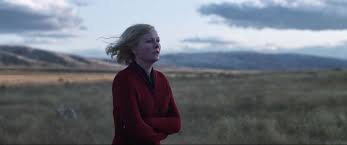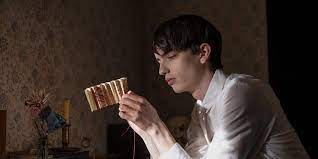The archetypal fascinating male in Jane Campion’s films – whether his allure for a woman owes to his earthy virility or emotional sensitivity, his animal appeal or his soul – has a malign other.
That’s true of The Piano (1993), In the Cut (2003) and Bright Star (2009), though in the latter movie’s then atypical triangle, it’s the poet John Keats whom his friend Charles Brown seeks to possess and control, at least intellectually – not Keats’s beloved, Fanny Brawne.
Brown's obsessive admiration for the poet anticipated the restrained homoerotic boy-crush that comes to dominate Campion’s brooding, mysterious adaptation of Thomas Savage’s 1967 semi-autobiographical The Power of the Dog, which unfolds on a Montana cattle ranch slowly yielding to modernity in 1925. The novel was informed by Savage’s belief he was unfit for ranch life and the succumbing of his mother, a cultured woman marooned on the prairie, to alcoholism.
The movie, shot in New Zealand, stars Benedict Cumberbatch and Jesse Plemons as wealthy ranching brothers Phil and George Burbank, Kirsten Dunst as the widowed Rose (pictured below), and Kodi Smit-McPhee as Rose’s teenage medical student son, Peter. Early on, Phil, an educated, dynamic outdoorsman unhappily realises that George, a reasonable, good-natured dullard, is drifting away from the cosy bachelor life they’ve sustained for a quarter of a century. Though he hasn’t a gill of Phil’s piss and vinegar machismo, genteel George – who drives an automobile – is the brother who readily embraces change and is the least likely of the pair to become obsolescent. 
Following a cattle drive to town, the brothers bring their outfit to eat (hungrier though the cowboys are for the local whores) in Rose’s modest restaurant. There Phil sneers at the paper roses – “Ain’t them purdy?” – and the gentle waiter, Peter, who made them for the tables. Despiser in public of everything feminine, Phil is subsequently appalled when George shortly afterward brings Rose home as his bride, her momma’s boy in tow. His masculine Eden breached, Phil duly wages psychological war on Rose – malevolently ruining her piano-playing with his banjo, for example – and drives her to drink. Gloated at by him as he watches her drunkenly stumbling among discarded bottles in a back alley, she’s like a bleeding ewe in the presence of a ravenous mountain lion. She doesn’t know that Peter, speaking in voiceover at the start of the picture, has pledged himself to protect her.
The fascinating male here is Phil, but he’s also the malign, controlling one, the repressed opposite of the sexually actualised and empathetic men played by Harvey Keitel in The Piano and Mark Ruffalo in In the Cut. His “other” isn’t George (who suggests a stiff, humorless Oliver Hardy), but the gawky, epicene Peter. Initially, Phil goads the boy and encourages his cowpunchers to mock him: one of them calls him “a faggot,” which too explicitly lays bare the film’s central tension.
Phil habitually reminisces about the long dead cowboy he idolised, Bronco Henry, who saved his life, he says, and may have mentored him in more than weaving rawhide ropes. Henry is associated with the suede-brown hills frequently seen in the background, among them a grotto where Phil stashes magazines celebrating muscular male physiques, and an adjacent lake where he secretly explores his sensuality with touching delicacy. The creased slopes of these hills resemble in one spot, according to Phil, a dog's mouth - a metaphor for animal ferocity - that Peter also says he can see but which the viewer might struggle to.
Phil’s attitude to Peter takes a sudden hairpin bend, and as they draw close Rose frets about what will happen to her son on the rides the two men take. Peter (pictured below, Kodi Smit-McPhee) shows he’s more than what he seems when he dissects his pet rabbit, shocking the maid (Thomasin McKenzie in a wispy role) and with his quick wit. The liberating paradox of Campion’s post-revisionist Western is that the man expected to do what a man’s gotta do cedes that imperative to his “unmanly” nemesis. A resolution is achieved by Peter that likens his medical knowledge to the Vicky Krieps character's "witchcraft" in Paul Thomas Anderson’s Phantom Thread (2017).  Campion has said #MeToo was an inspiration for making the film and terms like “toxic masculinity” and “gaslighting” have peppered her and Cumberbatch’s promotional interviews. Yet The Power of the Dog speaks to age-old hatreds that can’t be contained by contemporary sexual politics. Brutalised by his own brutality, Phil is a milder version of the hoodlum (Lee Marvin) who loathes his moll and stubs a cigarette on a barfly’s hand in The Big Heat (1953); Ethan Edward (John Wayne), who clandestinely loves his sister-in-law and would murder his niece in The Searchers (1956); and the 1790s master-of-arms (Robert Ryan) so disturbed by the beauty of a young new shipmate (Terence Stamp) that he must destroy him in Billy Budd (1962). Cumberbatch does his richest film work here – as does Dunst – though he’s more at ease as the relaxed, avuncular Phil schooling his protegé than as the cruel oppressor.
Campion has said #MeToo was an inspiration for making the film and terms like “toxic masculinity” and “gaslighting” have peppered her and Cumberbatch’s promotional interviews. Yet The Power of the Dog speaks to age-old hatreds that can’t be contained by contemporary sexual politics. Brutalised by his own brutality, Phil is a milder version of the hoodlum (Lee Marvin) who loathes his moll and stubs a cigarette on a barfly’s hand in The Big Heat (1953); Ethan Edward (John Wayne), who clandestinely loves his sister-in-law and would murder his niece in The Searchers (1956); and the 1790s master-of-arms (Robert Ryan) so disturbed by the beauty of a young new shipmate (Terence Stamp) that he must destroy him in Billy Budd (1962). Cumberbatch does his richest film work here – as does Dunst – though he’s more at ease as the relaxed, avuncular Phil schooling his protegé than as the cruel oppressor.
The Power of the Dog is as visually attuned to its subject matter as all of Campion’s pictures. Ari Wegner’s camera captures a masculine environment destabilised by its aridity, from the sombre wainscoating in the big ranch house to the trampled dirt outside it. A shot of the mounted Phil looking back over his shoulder, silhouette shots, chiaroscuro, and tracking shots that create frames within frames ramp up the sense of paranoia and moribundity that link the film not only to The Searchers but also to the noir Western Pursued (1947). There are glances, too, to Red River (1948), the contrast between Wayne’s threatening bulk and Montgomery Clift's girl-like slenderness echoed in the contrast between Phil’s hickory and Peter’s tender vine, on which he surreptitiously husbands poisonous grapes of wrath.















Add comment